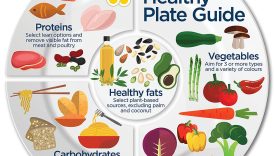Building Blocks of Wellness: Your Guide to a Basic Healthy Lifestyle
Understanding the Importance of Wellness
Wellness encompasses more than just physical health; it involves the holistic integration of mind, body, and spirit. Understanding the importance of wellness means recognizing that mental and emotional health is just as vital as maintaining a healthy diet or exercising regularly. Many people overlook the need for a balanced life, thinking that success is solely the absence of illness. However, true wellness allows individuals to thrive rather than simply survive. Take a moment to consider how stress impacts your day-to-day life. When one aspect of well-being is neglected, it can create a ripple effect that influences other areas.
- Building Blocks of Wellness: Your Guide to a Basic Healthy Lifestyle
- Understanding the Importance of Wellness
- Benefits of a Healthy Lifestyle
- Nutritious Diet
- The Role of Balanced Nutrition
- Importance of Hydration
- Regular Exercise
- Types of Physical Activities
- Creating a Fitness Routine
- Quality Sleep
- Impact of Sleep on Overall Wellness
- Tips for Improving Sleep
- Stress Management
- Identifying Sources of Stress
- Coping Strategies
- Mental Health
- Importance of Mental Wellbeing
- Practices for Mindfulness
- Social Connections
- Building a Support System
- Benefits of Social Relationships
- Healthy Habits
- Incorporating Self-Care Practices
- Breaking Unhealthy Patterns
- Preventive Healthcare
- Regular Health Check-ups
- Importance of Vaccinations
- Mind-Body Balance
- Understanding the Mind-Body Connection
- Practices for Holistic Wellness
Benefits of a Healthy Lifestyle
Adopting a healthy lifestyle provides a wealth of benefits, including:
- Increased Energy: A nutritious diet and regular exercise enhance stamina and vitality.
- Improved Mood: Engaging in physical activity releases endorphins, contributing to better mental health.
- Reduced Risk of Chronic Diseases: A balanced approach to wellness can decrease the likelihood of several health issues, including heart disease and diabetes.
- Enhanced Longevity: Making mindful choices may lead to a longer, healthier life.
Ultimately, embracing wellness fosters a sense of fulfillment, helping individuals live life to the fullest.
Nutritious Diet
The Role of Balanced Nutrition
Transitioning from the understanding of wellness, it’s vital to discuss the cornerstone of a healthy lifestyle: balanced nutrition. A nutritious diet fuels the body, providing the essential nutrients it needs to function optimally. Imagine your body as a car; it runs smoothly on high-quality fuel but struggles with lower-grade options. A balanced diet typically includes a variety of food groups:
- Fruits and Vegetables: Rich in vitamins, minerals, and fiber.
- Whole Grains: Provide energy and keep you feeling full longer.
- Lean Proteins: Support muscle repair and growth.
- Healthy Fats: Promote heart health and brain function.
Eating a diverse range not only ensures an intake of vital nutrients but also keeps meals exciting!
Importance of Hydration
Equally important to nutrition is hydration. Water plays a crucial role in virtually every bodily function, from regulating temperature to lubricating joints. Many people underestimate how much hydration they need, often waiting until they feel thirsty—a signal that the body is already seeking balance. Consider these hydration tips:
- Drink Water Regularly: Aim for at least 8 cups a day or more if active.
- Incorporate Hydrating Foods: Foods like cucumbers and oranges can add to your water intake.
- Listen to Your Body: Pay attention to your hydration cues, especially during exercise.
An adequately hydrated body can increase energy levels, enhance mental clarity, and support overall health. Staying on top of your nutrition and hydration sets the stage for a vibrant and active life.
Regular Exercise
Types of Physical Activities
Building on the importance of nutrition and hydration, regular exercise is another fundamental component of a healthy lifestyle. Physical activity not only strengthens the body but also enhances mental well-being. There are various types of exercise to suit different preferences and goals:
- Cardiovascular Exercises: Activities like running, cycling, or dancing get the heart pumping and improve endurance.
- Strength Training: Lifting weights or using resistance bands helps build and maintain muscle mass.
- Flexibility and Balance: Yoga and Pilates enhance flexibility, improve posture, and promote relaxation.
- Recreational Sports: Joining a local basketball or soccer team turns exercise into a fun social activity.
Incorporating a mix ensures a well-rounded fitness experience, catering to all aspects of health.
Creating a Fitness Routine
Establishing a fitness routine can be rewarding. It helps to set specific and achievable goals, like exercising three times a week for 30 minutes. Here are some tips for creating a successful routine:
- Schedule Your Workouts: Treat them like important appointments.
- Start Slow: If new to exercise, gradually increase intensity.
- Mix it Up: Alternate between different types of activities to keep things exciting and target various muscle groups.
- Listen to Your Body: Rest when necessary to avoid injuries.
Remember, consistency is key. Finding activities you enjoy can transform exercising into a regular and enjoyable part of your life, setting you on a path to greater health and vitality.
Quality Sleep
Impact of Sleep on Overall Wellness
Shifting from the importance of regular exercise, we arrive at another critical pillar of wellness: quality sleep. Many people underestimate the profound impact sleep has on overall health. Lack of adequate sleep can lead to a myriad of issues, including impaired cognitive function, increased stress levels, and a weakened immune system. Studies show that insufficient sleep can negatively affect mood and concentration, making even simple tasks seem daunting. Reflecting on personal experiences, people often find that after a good night’s sleep, they feel more energized and focused. This rejuvenation highlights how vital sleep is for maintaining both physical and mental health.
Tips for Improving Sleep
To foster better sleep, consider these practical tips:
- Create a Sleep Schedule: Go to bed and wake up at the same time daily, even on weekends.
- Limit Screen Time: Reduce exposure to screens at least an hour before bedtime, as blue light can disrupt sleep.
- Design a Relaxing Routine: Engage in calming activities, such as reading or meditating, to signal to your body that it’s time to wind down.
- Create a Comfortable Sleep Environment: Ensure your bedroom is cool, dark, and quiet.
Incorporating these strategies can significantly improve the quality of sleep, setting the foundation for a healthier, more vibrant life.
Stress Management
Identifying Sources of Stress
Continuing from the essentials of quality sleep, stress management is a crucial aspect of maintaining overall wellness. The first step in managing stress is recognizing its sources, which can often be hidden in the busyness of daily life. These stressors can range from work deadlines and relationship issues to financial concerns and personal health challenges. Reflecting on one’s experiences, a common source of stress might be the juggling of multiple responsibilities, leading to feelings of overwhelm. Identifying what triggers stress serves as a powerful tool, enabling individuals to address these issues head-on rather than letting them accumulate.
Coping Strategies
Once stressors are identified, effective coping strategies can make a world of difference. Here are a few practical methods to consider:
- Practice Mindfulness: Engaging in meditation or deep-breathing exercises can ground you in the present moment, reducing anxiety.
- Stay Organized: Keeping a planner or to-do list helps manage tasks and minimizes feelings of chaos.
- Connect with Others: Sharing concerns with friends or family not only provides support but also helps to put stressors in perspective.
- Engage in Hobbies: Taking time for activities you love, like painting or gardening, can serve as a delightful distraction.
Incorporating these strategies can lead to a more balanced life, empowering individuals to handle stress effectively while enhancing overall well-being.
Mental Health
Importance of Mental Wellbeing
Continuing from effective stress management, mental health plays an integral role in overall wellness. The significance of mental well-being cannot be overstated; it affects every aspect of life, including relationships, work performance, and physical health. Poor mental health can manifest in several ways, from feelings of anxiety and depression to a lack of motivation. Many individuals might reflect on times when personal challenges felt overwhelming, illustrating how mental health directly impacts daily functioning. By prioritizing mental wellness, we empower ourselves to cope with life’s ups and downs more effectively.
Practices for Mindfulness
One of the most effective tools for enhancing mental health is mindfulness. Engaging in mindfulness practices encourages individuals to focus on the present moment, reducing anxiety and fostering a sense of peace. Here are a few practices to consider:
- Meditation: Set aside a few minutes each day to sit quietly, focusing solely on your breath.
- Gratitude Journaling: Write down three things you are grateful for each day. This shift in focus promotes positivity.
- Guided Imagery: Picture a peaceful scene in your mind, immersing yourself in the details—the sounds, colors, and sensations.
Incorporating these mindfulness practices into daily routines can significantly enhance mental well-being, fostering a healthier, more balanced approach to life.
Social Connections
Building a Support System
As we transition from the significance of mental health, it’s essential to highlight the role of social connections in enhancing overall wellness. Building a support system is vital, as strong relationships can provide a buffer against stress and a source of encouragement during challenging times. Consider a time in your life when having someone to talk to made all the difference. Whether it’s a close friend, family member, or a community group, cultivating these connections can significantly boost emotional resilience. Here are some practical ways to build a support system:
- Reach Out to Loved Ones: Don’t hesitate to initiate conversations to strengthen existing relationships.
- Join Clubs or Classes: Engage in activities that interest you; this can open up new social circles.
- Volunteer: Helping others is a great way to meet like-minded individuals and foster friendships.
Benefits of Social Relationships
The benefits of social relationships are profound. Studies show that strong social ties can lead to:
- Improved Mental Health: Sharing experiences with others helps reduce feelings of loneliness and anxiety.
- Increased Happiness: Positive interactions and shared laughter can elevate mood and overall satisfaction.
- Enhanced Longevity: Socially active individuals tend to live longer, as connections can encourage healthier lifestyles.
Ultimately, nurturing social connections not only enriches our experiences but also contributes to a fulfilling, healthier life. Embracing these relationships allows individuals to thrive, reinforcing the idea that we are never truly alone in our journeys.
Healthy Habits
Incorporating Self-Care Practices
Building on the importance of social connections, cultivating healthy habits is essential for sustaining wellness. One of the most effective ways to enhance your overall health is by incorporating self-care practices into daily life. Self-care is not merely a luxury; it’s a necessity that allows individuals to recharge and reconnect with themselves. Consider simple yet powerful self-care activities, such as:
- Setting Boundaries: Learning to say no can protect your time and energy.
- Engaging in Hobbies: Dedicate time to activities that bring joy, whether it’s painting, gardening, or reading.
- Prioritizing Downtime: Create a daily routine that includes moments for relaxation, whether through meditation or enjoying a hot bath.
Breaking Unhealthy Patterns
Transitioning to healthier habits also means recognizing and breaking unhealthy patterns. These habits often sneak into daily routines without notice. Take time to reflect on behaviors that may be adversely affecting your health, such as:
- Mindless Eating: Snacking while watching TV can lead to overeating. Instead, focus on meals at the table.
- Procrastination: Delaying tasks can increase stress. Create small, actionable steps to tackle projects promptly.
- Digital Overload: Excessive screen time can lead to burnout. Set limits to prioritize face-to-face interactions and offline activities.
By consciously incorporating self-care practices and addressing unhealthy patterns, individuals can pave the way toward a more balanced and fulfilling life, enhancing their physical, mental, and emotional well-being.
Preventive Healthcare
Regular Health Check-ups
Transitioning from healthy habits, let’s delve into preventive healthcare, a critical element for maintaining long-term wellness. Regular health check-ups serve as the foundation for this preventive approach. These routine visits help identify potential health issues before they escalate into more serious conditions. Reflecting on personal experiences, scheduling those annual check-ups can feel like a chore, but the peace of mind they provide is invaluable. During these appointments, healthcare providers can assess overall health, monitor vital signs, and conduct necessary screenings. Here are some key check-ups to consider:
- Annual Physical Exam: Essential for assessing overall health and discussing any concerns.
- Dental Check-ups: Regular visits help maintain oral health and prevent issues.
- Eye Exams: Regular eye checks ensure vision health and early detection of problems.
Importance of Vaccinations
Equally important in preventive healthcare is the role of vaccinations. Vaccines play a vital part in protecting individuals and communities by preventing the spread of infectious diseases. Consider the comfort of knowing that vaccinations like the flu shot or the COVID-19 vaccine significantly reduce the risk of serious illness. Here are some key points about vaccinations:
- Herd Immunity: Widespread vaccination helps protect those who cannot be vaccinated, such as young children or individuals with certain health conditions.
- Cost-Effectiveness: Preventing diseases through vaccination is more cost-effective than treating them later.
- Travel Requirements: Certain vaccinations may be essential for international travel, ensuring both your health and that of others.
Incorporating regular health check-ups and vaccinations into your routine not only safeguards your health but also contributes to the broader well-being of the community. Prioritizing preventive healthcare is an investment in a healthier future.
Mind-Body Balance
Understanding the Mind-Body Connection
As we conclude our discussion on preventive healthcare, it’s essential to explore the concept of mind-body balance. Understanding the mind-body connection emphasizes how mental and emotional states directly impact physical health. For instance, have you ever noticed how stress can lead to physical symptoms like headaches or digestive issues? This interplay highlights the significance of acknowledging both mental and physical health together. Recognizing this connection empowers individuals to take a holistic approach to wellness, involving both psychological well-being and physical fitness. When one aspect falters, it often affects the other, creating a cycle that can be challenging to break.
Practices for Holistic Wellness
To cultivate a harmonious mind-body balance, consider incorporating the following practices into your daily routine:
- Yoga and Tai Chi: These practices combine movement with mindfulness, fostering both physical strength and mental clarity.
- Breathwork: Focusing on deep, intentional breathing can help calm the mind and enhance emotional resilience.
- Nutrition for the Mind: Eating brain-boosting foods, like fatty fish and leafy greens, not only nourishes the body but also supports cognitive function.
- Journaling: Reflective writing promotes emotional processing and clarity, helping alleviate anxiety and stress.
Incorporating these practices consistently can lead to enhanced overall wellness, creating a rich tapestry of physical vitality and mental serenity. Ultimately, achieving mind-body balance is a journey—a commitment to nurturing both aspects of your health for a fulfilling life.





